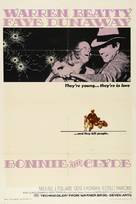Reviews provided by RottenTomatoes
Bosley Crowther, New York Times: It is a cheap piece of bald-faced slapstick comedy that treats the hideous depredations of that sleazy, moronic pair as though they were as full of fun and frolic as the jazz-age cutups in Thoroughly Modern Millie. Read more
Dave Kehr, Chicago Reader: It's by far the least controlled of Penn's films... but the pieces work wonderfully well, propelled by what was then a very original acting style. Read more
John Mahoney, Hollywood Reporter: [A] film ... destined to be among the year's most discussed, honored and profitable. Read more
Penelope Gilliatt, New Yorker: Bonnie and Clyde don't really know that killing kills. The film does -- unlike the run of movies about violence now, which mostly know that killing sells. Read more
Pauline Kael, New Yorker: Bonnie and Clyde is the most excitingly American American movie since The Manchurian Candidate. The audience is alive to it. Read more
James Berardinelli, ReelViews: It should readily be apparent that there is something special about the production, with its brash, vivid style, indelible performances by movie icons, and bold mixture of violence and comedy, romance and tragedy. Read more
Roger Ebert, Chicago Sun-Times: When I saw it, I had been a film critic for less than six months, and it was the first masterpiece I had seen on the job. I felt an exhilaration beyond describing. Read more
TIME Magazine: Like Bonnie and Clyde themselves, the film rides off in all directions and ends up full of holes. Read more
Time Out: With its weird landscape of dusty, derelict towns and verdant highways, stunningly shot by Burnett Guffey in muted tones of green and gold, it has the true quality of folk legend. Read more
Dave Kaufman, Variety: This inconsistency of direction is the most obvious fault of Bonnie and Clyde, which has some good ingredients, although they are not meshed together well. Read more
Nick Pinkerton, Village Voice: Considered New Hollywood's moment of arrival, tipping square critic Bosley Crowther into retirement (The New York Times, they were a-changin'). Read more

